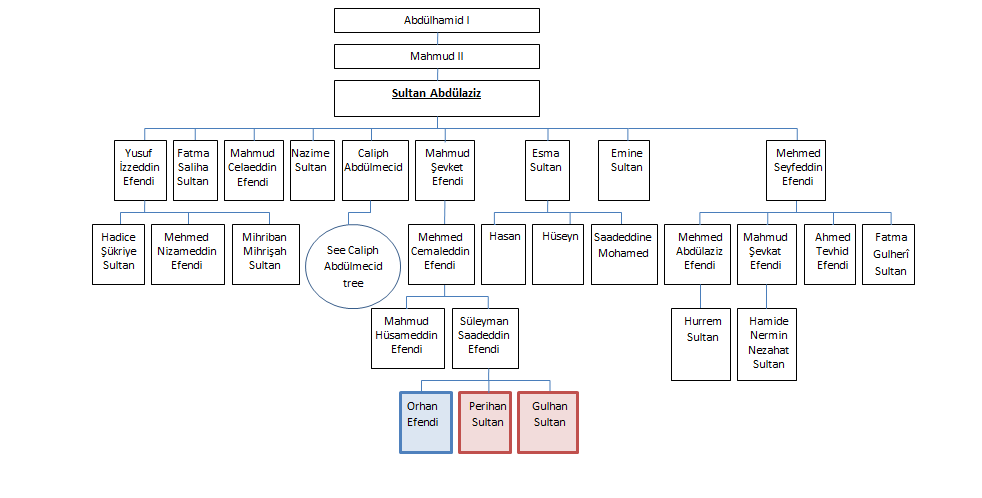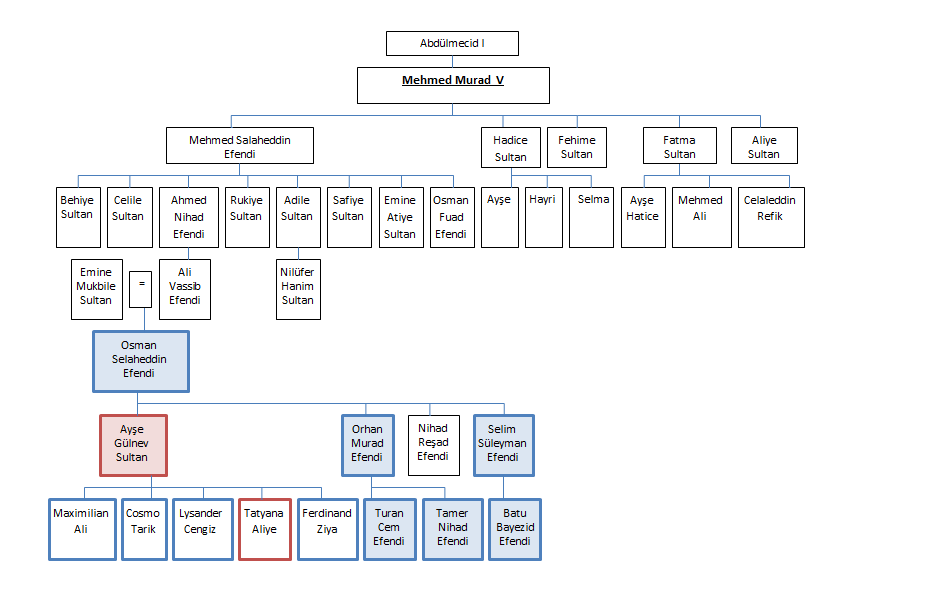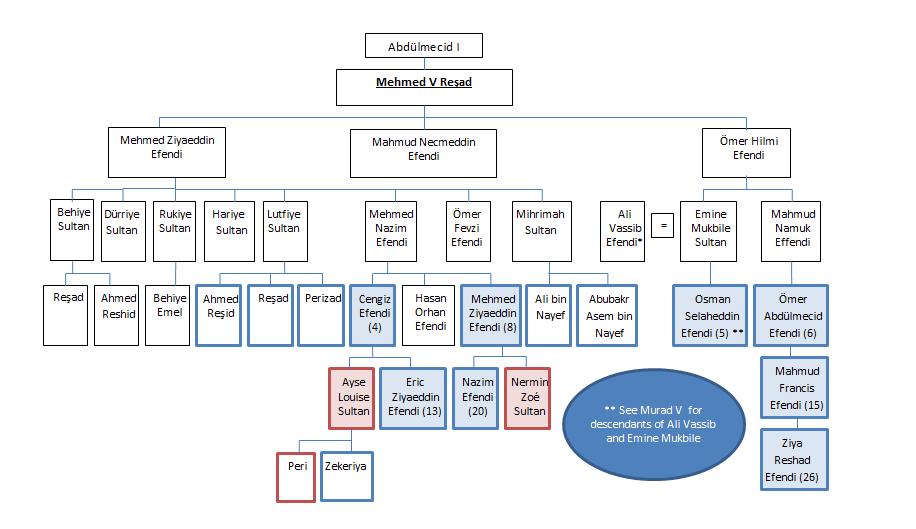Osmanoğlu family
The Osmanoğlu family refers to the current members of the historical House of Osman (the Ottoman dynasty), who were the sole rulers and the namesake of the Ottoman Empire from 1299 until the establishment of the Republic of Turkey in 1923.
There were 36 Ottoman Sultans who ruled over the Empire, and each one was a direct descendant through the male line of the first Ottoman Sultan, Sultan Osman I. After the deposition of the last Sultan, Mehmet VI, in 1922, and the subsequent abolition of the Ottoman Caliphate in 1924, members of the Imperial family were forced into exile. Their descendants now live in many different countries throughout Europe, as well as in the United States, the Middle East, and since they have now been permitted to return to their homeland, many now also live in Turkey. When in exile, the family adopted the surname of Osmanoğlu, meaning "son of Osman", after the founder of the House of Osman and direct ancestor of all current family members.
Heads of the House of Osman since 1923
The Ottoman dynasty was exiled from Turkey in 1924.[1] The female members of the dynasty were allowed to return after 1951,[1] and the male members after 1973.[2] Below is a list of people who would have been heirs to the Ottoman throne following the abolition of the sultanate on 1 November 1922.[2] These people have not necessarily made any claim to the throne; for example Ertuğrul Osman said "Democracy works well in Turkey.".[3]
- Mehmed VI, last Ottoman Sultan (1918–1922) then 36th Head of the House of Osman in exile (1922–1926).[2]
- Abdülmecid II, last Ottoman Caliph (1922–1924) then 37th Head of the House of Osman following Mehmed VI's death (1926–1944).[2]
- Ahmed IV Nihad, 38th Head of the House of Osman (1944–1954), grandson of Sultan Murad V.[2]
- Osman IV Fuad, 39th Head of the House of Osman (1954–1973), brother of Ahmed IV Nihad, and grandson of Sultan Murad V.[2]
- (Mehmed) Abdülaziz II, 40th Head of the House of Osman (1973–1977), grandson of Sultan Abdülaziz I.[2]
- Ali I Vâsib, 41st Head of the House of Osman (1977–1983), son of Ahmed IV Nihad, and great-grandson of Sultan Murad V.[2]
- (Mehmed) Orhan II, 42nd Head of the House of Osman (1983–1994), grandson of Sultan Abdul Hamid II.[4]
- Ertuğrul Osman V, 43rd Head of the House of Osman (1994–2009), grandson of Sultan Abdul Hamid II. He is known as "the Last Ottoman" or "the Last Ottoman Emperor" by the Turkish society.[3]
- (Osman) Bayezid III, 44th Head of the House of Osman (2009–present), great-grandson of Sultan Abdülmecid I.[5]
Resurgence of interest in the Ottoman family
Since the turn of this century there has been a growing interest in the living members of the Ottoman family, both within Turkey and abroad.[6]
In 2006, family members met at Dolmabahçe Palace for the presentation of the documentary Osmanoğlu'nun Sürgünü (The Ottomans' Exile) produced by TRT (Turkish Radio and Television Corporation).[7] This documentary followed the stories of the members of the Ottoman family who went into exile in 1924, following the establishment of the Turkish Republic and the abolition of the Ottoman Caliphate. It then follows the stories of their descendants, who now live in Turkey, Europe, North America, and throughout the Middle East. Extensive coverage of this event, and the success of the documentary series has dramatically raised the profile of the Imperial Family.[6][8]
According to the New York Times, historians said that the show of reverence at the funeral of Prince Ertuğrul Osman in September 2009 was a "seminal moment in the rehabilitation of the Ottoman Empire".[9]
An interview with Prince Mahmud Efendi by the Anatolian News Agency was published in several publications in Turkey and the UK. A Sultan's descendant in the heart of London
Turkish citizenship
Without exception, all high-ranking members of the Imperial Ottoman family were exiled in 1924. Most had never left their homeland before, and all were forced to make a new life abroad. The family departed from Sirkeci Train Station, and would disperse across Europe, the United States and the Middle East. In exile, the family lived in poverty.[10] As the former Ottoman Sultan Mehmed VI Vahideddin had settled in San Remo, many members of the family congregated in the South of France. After living in Switzerland for a short time, the last Caliph of Islam Prince (Şehzade) Abdulmecid II, also moved to the French Riviera, settling in Nice. The Turkish Republic had issued the exiled Ottoman family members with travel documents but they were only valid for one year. Therefore, by 1925 members of the family were no longer able to travel. Prince (Şehzade) Ali Vâsib Efendi appealed to the French Government and succeeded in obtaining courtesy passports for them. The French Government also issued passports to the children of the members of the family who were born in exile. In the years since the exile was lifted, many members of the Ottoman family have obtained Turkish citizenship and hold Turkish passports.
Imperial Princes (Şehzades) of the House of Osman
The formal way of addressing the male descendants of the Ottoman Sultans is Daulatlu Najabatlu Şehzade (given name) Hazretleri Efendi, i.e. Prince (given name) Efendi, with the style of His Imperial Highness. According to genealogies of the House of Osman, had the Sultanate not been abolished, there would be twenty-four Imperial Princes in the line of succession after Bayezid Osman, the current head of the family.[11][12][13] The succession law used is agnatic seniority, with the succession passing to eldest male dynast.[14]
- Prince Şehzade Dündar Aliosman Efendi (b. 1911) (descendant of Abdul Hamid II)[12][13][14][15][16]
- Prince Şehzade Ibro Osmanoğlu Haçimuratoglu Efendi (b. 1913) (descendant of Abdul Hamid II)[11][12][13][14][15][16]
- Prince Şehzade Osman Selaheddin Osmanoğlu Efendi (b. 1940) (descendant of Murad V through Ahmed IV and Ali I, and of Mehmed V through Ömer Hilmi)[11][12][13][14][15][16]
- Prince Şehzade Ömer Abdülmecid Osmanoğlu Efendi (b. 1941) (descendant of Mehmed V through Ömer Hilmi and Mahmud Namık)[11][12][13][16]
- Prince Şehzade Mehmed Ziyaeddin Efendi (b. 1947) (descendant of Mehmed V)[11][12][13][15][16]
- Prince Şehzade Roland Selim Kadir Efendi (b. 1949) (descendant of Abdul Hamid II)[11][12][13][14][16]
- Prince Şehzade Selim Djem Efendi (b. 1955) (descendant of Abdülmecid I)[11][12][13][14][16]
- Prince Şehzade Orhan İbrahim Suleiman Saadeddin Efendi (b. 1959) (descendant of Abdülaziz I)[11][12][13][14][16]
- Prince Şehzade Orhan Osmanoğlu Efendi (b. 1963) (descendant of Abdul Hamid II)[11][12][13][14][16]
- Prince Şehzade Eric Mehmed Ziyaeddin Nazim Efendi (b. 1966) (descendant of Mehmed V)[11][12][13][16]
- Prince Şehzade Orhan Murad Osmanoğlu Efendi (b. 1972) (descendant of Murad V through Ahmed IV and Ali I, and of Mehmed V through Ömer Hilmi)[11][12][13][14][15][16]
- Prince Şehzade Francis Mahmud Namık Osmanoğlu Efendi (b. 1975) (descendant of Mehmed V through Ömer Hilmi and Mahmud Namık)[11][12][13][16]
- Prince Şehzade René Osman Abdul Kadir Efendi (b. 1975) (descendant of Abdul Hamid II)[11][12][13][14][16]
- Prince Şehzade Fadil Haçimuratoglu Efendi (b. 1953) (descendant of Abdul Hamid II)[11][12][13][14][16]
- Prince Şehzade Abdulhamid Kayıhan Osmanoğlu Efendi (b. 1979) (descendant of Abdul Hamid II)[11][12][13][14][16]
- Prince Şehzade Selim Süleyman Osmanoğlu Efendi (b. 1979) (descendant of Murad V through Ahmed IV and Ali I, and of Mehmed V through Ömer Hilmi)[11][12][13][14][16]
- Prince Şehzade Nazım Osmanoğlu Efendi (b. 1985) (descendant of Mehmed V)[11][12][13][16]
- Prince Şehzade Yavuz Selim Osmanoğlu Efendi (b. 1989) (descendant of Abdul Hamid II)[11][12][13][14][16]
- Prince Şehzade Turan Cem Osmanoğlu Efendi (b. 2004) (descendant of Murad V through Ahmed IV and Ali I)[11][12][13][16]
- Prince Şehzade Tamer Nihad Osmanoğlu Efendi (b. 2006) (descendant of Murad V through Ahmed IV and Ali I)[11][12][13][16]
- Prince Şehzade Harun Osmanoğlu Efendi (b. 2007) (descendant of Abdul Hamid II)[11][12][13]
- Prince Şehzade Batu Bayezid Osmanoğlu Efendi (b. 2008) (descendant of Murad V through Ahmed IV and Ali I)[11][12][13][16]
- Prince Şehzade Ziyaeddin Reşad Osmanoğlu Efendi (b. 2012) (descendant of Mehmed V through Ömer Hilmi and Mahmud Namık)[11][12][13][16]
- Prince Şehzade Ömer Cem Osmanoğlu Efendi (b. 2015) (descendant of Mehmed V through Ömer Hilmi and Mahmud Namık)[11][12][13][16]
Imperial Princesses (Sultans) of the House of Osman
The formal way of addressing the female descendants of the Ottoman Sultans is Daulatlu Hazretleri (given name) Sultan, i.e. Princess (given name) Sultan, with the style of Her Imperial Highness. According to genealogies of the House of Osman, had the Sultanate not been abolished, there would be fourteen Imperial Princesses
- Princess Margot Leyla Sultan (b. 1947) (descendant of Abdul Hamid II)[11][12][13][14][15][16]
- Princess Nilüfer Sultan (b. 1953) (descendant of Abdülmecid I)[11][12][13][14][15][16]
- Princess Perihan Sultan (b. 1963) (descendant of Abdülaziz)[11][12][13][14][15][16]
- Princess Ayşe Louise Sultan (b. 1964) (descendant of Mehmed V)[11][12][13][14][15][16]
- Princess Gülhan Sultan (b. 1968) (descendant of Abdülaziz)[11][12][13][14][15][16]
- Princess Ayşe Gülnev Sultan (b. 1971) (descendant of Murad V through Ahmed IV and Ali I, and of Mehmed V through Ömer Hilmi)[11][12][13][16]
- Princess Nurhan Sultan (b. 1973) (descendant of Abdul Hamid II)[11][12][13][14][16]
- Princess Tamarah Haçimuratoglu Sultan (b. 1988) (descendant of Abdul Hamid II)[11][12][13][14][16]
- Princess Zoe Sultan (b. 1988) (descendant of Mehmed V)[11][12][13][14][15][16]
- Princess Nilüfer Sultan (b. 1995) (descendant of Abdul Hamid II)[11][12][13][14][15][16]
- Princess Berna Sultan (b. 1998) (descendant of Abdul Hamid II)[11][12][13][14][16]
- Princess Asyahan Sultan (b. 2004) (descendant of Abdul Hamid II)[11][12][13][14][16]
- Princess Esma Emira Sultan (b. 2015) (descendant of Murad V through Ahmed IV and Ali I, and of Mehmed V through Ömer Hilmi)[11][12][13][16]
Family trees
Family tree of the branch of the Ottoman Dynasty descending from Abdulaziz

Family tree of the branch of the Ottoman Dynasty descending from Mehmed Murad V

Family tree of the branch of the Ottoman Dynasty descending from Abdulhamid II

Family tree of the branch of the Ottoman Dynasty descending from Mehmed V Reshad

Family tree of the branch of the Ottoman Dynasty descending from Mehmed IV Vahiddeddin.

Family tree of the branch of the Ottoman Dynasty descending from Caliph Abdulmecid

Family tree of the branch of the Ottoman Dynasty descending from Mehmed V Reshad

See also
- Ottoman dynasty, the historical form of the family
- Line of succession to the former Ottoman throne, solely populated by members of the family
References
- 1 2 Brookes, Douglas (2008). The concubine, the princess, and the teacher: voices from the Ottoman harem. University of Texas Press. pp. 278, 285. Retrieved 2011-04-14.
- 1 2 3 4 5 6 7 8 Opfell, Olga (2001). Royalty who wait: the 21 heads of formerly regnant houses of Europe. McFarland. pp. 146, 151. Retrieved 2011-04-14.
- 1 2 Bernstein, Fred. “Ertugrul Osman, Link to Ottoman Dynasty, Dies at 97”, The New York Times (2009-09-24).
- ↑ Pope, Hugh. "Oldest Ottoman to come home at last", The Independent (1992-07-22).
- ↑ "'Osmanoğulları'na insanlık şehadet edecek'", Zaman (newspaper) (2009-09-27).
- 1 2 Bilefsky, Dan (4 December 2009). "Turkey Reveling in Its Past". The New York Times.
- ↑ Akgüneş, Gürkan 2006 "Şehzadeler sarayda buluştu" Milliyet Retrieved 2011-07-20
- ↑ 2006 "2006 yılından hanedanın bir videosu" Ottoman Dynasty Foundation Retrieved 2011-07-20
- ↑ Bilefsky, Dan 2009-12-4 "Frustrated with the West, Turks Revel in Empire Lost" New York Times Retrieved 2011-07-20
- ↑ "The Ottoman caliphate: Worldly, pluralist, hedonistic—and Muslim, too". The Economist. 19 December 2015. Retrieved 26 December 2015.
- 1 2 3 4 5 6 7 8 9 10 11 12 13 14 15 16 17 18 19 20 21 22 23 24 25 26 27 28 29 30 31 32 33 34 35 36 37 "Hayatta Olan Şehzadeler". Foundation of the Ottoman Dynasty. Retrieved 15 April 2011.
- 1 2 3 4 5 6 7 8 9 10 11 12 13 14 15 16 17 18 19 20 21 22 23 24 25 26 27 28 29 30 31 32 33 34 35 36 37 38 "Osmanlı Hanedanı vakıf çatısı altında toplanıyor". Sabah. 13 September 2010. Retrieved 16 April 2011.
- 1 2 3 4 5 6 7 8 9 10 11 12 13 14 15 16 17 18 19 20 21 22 23 24 25 26 27 28 29 30 31 32 33 34 35 36 37 38 İbrahim Pazan (15 September 2009). "Osmanoğullarının yeni reisi Osman Bayezid Efendi". Netgazete. Retrieved 16 April 2011.
- 1 2 3 4 5 6 7 8 9 10 11 12 13 14 15 16 17 18 19 20 21 22 23 24 25 Almanach de Gotha (184th ed.). Almanach de Gotha. 2000. pp. 365, 912–915.
- 1 2 3 4 5 6 7 8 9 10 11 12 Burke's Royal Families of the World (2 ed.). Burke's Peerage. 1980. p. 247.
- 1 2 3 4 5 6 7 8 9 10 11 12 13 14 15 16 17 18 19 20 21 22 23 24 25 26 27 28 29 30 31 32 33 34 35 36 "Current Living Şehzades". Official Ottoman Family Website. Retrieved 15 April 2011.